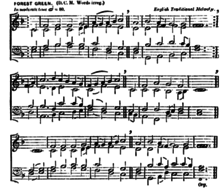O Little Town of Bethlehem
| "O Little Town of Bethlehem" | |
|---|---|
 Author's manuscript of first stanza | |
| Song | |
| Published | c. 1868 |
| Form | Christmas carol |
| Writer(s) | Phillips Brooks |
| Composer(s) | Lewis Redner ("St Louis"), Ralph Vaughan Williams ("Forest Green"), Henry Walford Davies ("Wengen" and "Christmas Carol") |
| Language | English |
| Wikisource has original text related to this article: |
 |
O Little Town of Bethlehem (St. Louis version)
|
| Problems playing this file? See media help. | |
O Little Town of Bethlehem is a popular Christmas carol.
Words
The text was written by Phillips Brooks (1835–1893), an Episcopal priest, rector of the Church of the Holy Trinity, Philadelphia. He was inspired by visiting the village of Bethlehem in the Sanjak of Jerusalem in 1865. Three years later, he wrote the poem for his church and his organist, Lewis Redner, added the music.
Music
.png)
Redner's tune, simply titled "St. Louis", is the tune used most often for this carol in the United States.[1] Redner recounted the story of his composition in 1924:[1]
As Christmas of 1868 approached, Mr. Brooks told me that he had written a simple little carol for the Christmas Sunday-school service, and he asked me to write the tune to it. The simple music was written in great haste and under great pressure. We were to practice it on the following Sunday. Mr. Brooks came to me on Friday, and said, ‘Redner, have you ground out that music yet to "O Little Town of Bethlehem"? I replied, 'No,' but that he should have it by Sunday. On the Saturday night previous my brain was all confused about the tune. I thought more about my Sunday-school lesson than I did about the music. But I was roused from sleep late in the night hearing an angel-strain whispering in my ear, and seizing a piece of music paper I jotted down the treble of the tune as we now have it, and on Sunday morning before going to church I filled in the harmony. Neither Mr. Brooks nor I ever thought the carol or the music to it would live beyond that Christmas of 1868.
My recollection is that Richard McCauley, who then had a bookstore on Chestnut Street west of Thirteenth Street, printed it on leaflets for sale. Rev. Dr. Huntington, rector of All Saints' Church, Worcester, Mass., asked permission to print it in his Sunday-school hymn and tune book, called The Church Porch,[2] and it was he who christened the music 'Saint Louis.'

In the British Commonwealth, and sometimes in the U.S. (especially in the Episcopal Church), the English hymn tune "Forest Green" is used instead. "Forest Green" was adapted by Ralph Vaughan Williams from an English folk ballad called "The Ploughboy's Dream" which he had collected from a Mr. Garman of Forest Green, Surrey in 1903.[3][4][5] Henry Garman was born in 1830 in Sussex, and in the 1901 census was living in Ockley, Surrey; Vaughan Williams' manuscript notes he was a "labourer of Forest Green near Ockley - Surrey. (Aged about 60?)", although Mr Garman would have been nearer 73 when he recited the tune.[6] The tune has a strophic verse structure and is in the form A-A-B-A. Adapted into a hymn tune harmonised by Vaughan Williams, it was first published in the English Hymnal of 1906.
Two versions also exist by H. Walford Davies, called "Wengen", and "Christmas carol".[7][8] "Wengen" was published in Hymns Ancient and Modern in 1922,[9] meanwhile "Christmas Carol" is usually performed only by choirs rather than as a congregational hymn. This is because the first two verses are for treble voices with organ accompaniment, with only the final verse as a chorale/refrain harmony. This setting includes a recitative from the Gospel of Luke at the beginning, and cuts verses 2 and 4 of the original 5-verse carol. This version is often performed at the service of Nine Lessons and Carols in Kings College, Cambridge.[10]
William Rhys-Herbert included a new hymn-tune and harmonization as part of his 1909 cantata, Bethany.
Renditions by Popular Singers
- Jeremy Camp (Christmas: God with Us)
- Mariah Carey (Merry Christmas II You)
- The Carpenters (An Old-Fashioned Christmas)
- Johnny Cash (Classic Christmas)
- Neil Diamond (The Christmas Album, Volume II)
- Emmylou Harris (Light of the Stable)
- Sarah McLachlan (Wintersong)
- Barbra Streisand (A Christmas Album)
- Jim Reeves (Twelve Songs of Christmas)
- Phil Everly (Christmas with the Everly Brothers and the Boystown Choir)
- Elvis Presley (Elvis' Christmas Album)
- Glen Campbell (Home for the Holidays)
References
- 1 2 Louis F. Benson, "O Little Town of Bethlehem". Studies Of Familiar Hymns, First Series (Philadelphia: The Westminster Press. 1924), 11
- ↑ William Reed Huntington (ed.) The Church Porch: A Service Book and Hymnal for Sunday Schools (E.P. Dutton, 1882)
- ↑ Vaughan Williams' Manuscript of "The Ploughboy's Dream" at the Vaughan Williams Memorial Library Full English collection, accessed 30 March 2014
- ↑ Byron Adams, Robin Wells, "Hymn Tunes from Folk Songs" in Vaughan Williams essays, Volume 3; Volume 44, (Ashgate Publishing, 2003), ISBN 978-1-85928-387-5 p.111
- ↑ "O Little Town of Bethlehem (Vaughan Williams)" English hymn.
- ↑ Mark Browse, O Little Town, 141-142
- ↑ http://www.hyperion-records.co.uk/dw.asp?dc=W3446_GBAJY0110304&vw=dc
- ↑ http://mander-organs-forum.invisionzone.com/index.php?/topic/3764-walford-davies-tune-for-o-little-town/
- ↑ Hymns Ancient and Modern (London: William Clowes and Sons, Ltd., 1922)
- ↑ Order of Service, A Festival of Nine Lessons and Carols 1999, King's College Cambridge 1999.
External links
- Free arrangements for piano and SATB from Cantorion.org (PD, CPDL)
- Free arrangement for female choir (SSA) by Ulrich Kaiser
- Free hymn arrangement in the IMSLP Petrucci Music Library
- Free score
- Score of Wengen: (pt 1, pt 2)
- Score of Christmas Carol